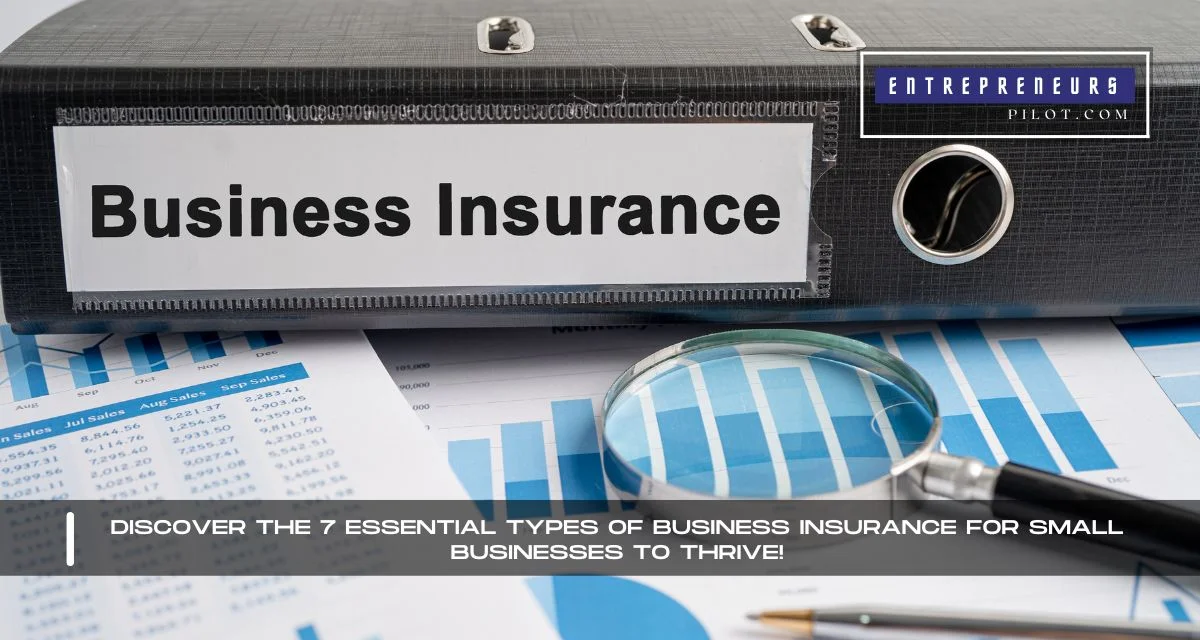Introduction
In the vibrant tapestry of the small business world, each thread represents a dream, a livelihood, and a risk. Navigating this landscape requires more than just passion and perseverance; it demands protection. That’s where understanding the Types Of Business Insurance For Small Businesses comes into play, a beacon of security in the unpredictable journey of entrepreneurship. From the unexpected to the unavoidable, these insurance types stand as pillars that not only safeguard your venture but also empower it to thrive amidst challenges. Embark on this enlightening journey with us, and unveil the seven essential insurance policies that promise not just survival but prosperity for your small business.
Table of Contents
The Spectrum of Protection: Essential Insurance Types
1. General Liability Insurance
This foundational coverage is non-negotiable for any small business. It protects against claims of bodily injury, property damage, and advertising injury that can arise from your business operations. Whether a customer slips in your store or your advertisement inadvertently infringes on someone else’s copyright, general liability insurance is your first line of defense, ensuring that a single incident doesn’t derail your business dreams.
2. Professional Liability Insurance
Also known as Errors and Omissions (E&O) insurance, this is crucial for businesses that provide services or advice. It covers legal defense costs and settlements if your business is accused of providing inadequate work, negligence, or making mistakes in the services offered. For consultants, accountants, and legal professionals, this insurance is a shield against the vulnerabilities inherent in their advice-driven services.
- For Expert Financial Insights And Guidance, You Can Visit Our Sister Site – ArabsGeek.com Now!
- Curiosity Piqued? Dive Into the Most Captivating Financial Content by Visiting Our Homepage!
- Unlock Exclusive Business Opportunities! 🚀 Connect with Us Now at our Email: [email protected]!
3. Business Owners Policy (BOP)
A Business Owners Policy is like a Swiss Army knife for small business insurance, bundling general liability with property insurance and sometimes business interruption insurance. It’s designed for small to medium-sized businesses, offering a cost-effective solution that covers a broad spectrum of risks, from property damage to lost income due to unforeseen closures. It’s a streamlined way to protect your physical and financial assets.
4. Workers’ Compensation Insurance
The moment you hire your first employee, workers’ compensation insurance becomes a must. It provides benefits to employees who suffer work-related injuries or illnesses, covering their medical expenses, a portion of lost wages, and rehabilitation costs. Not only is it a legal requirement in most states, but it also demonstrates a commitment to your team’s well-being, fostering a supportive workplace culture.
5. Cyber Liability Insurance
In an era where digital operations are at the heart of many small businesses, cyber liability insurance has transitioned from optional to essential. It protects against data breaches and other cyber security threats that could compromise customer information, financial data, and your business’s reputation. With cyber-attacks becoming more prevalent, this coverage is a critical safeguard for any business with an online presence.
6. Commercial Property Insurance
Whether you own or lease your workspace, commercial property insurance is vital. It covers the physical assets of your business—buildings, equipment, inventory, furniture—against damage from fires, storms, theft, and some natural disasters. This insurance ensures that the tools of your trade are protected, allowing you to rebuild and rebound quickly after a loss.
7. Business Interruption Insurance
Sometimes, the unexpected halts your business operations entirely. Business interruption insurance, often included in a BOP, compensates for lost income during these periods. If a fire or natural disaster forces your business to close temporarily, this insurance can cover expenses like rent, payroll, and lost earnings, keeping your business afloat until it’s operational again.
Conclusion | Types Of Business Insurance For Small Businesses
For small businesses, the right insurance is not just a safety net—it’s a launchpad for growth and resilience. The seven essential types of business insurance for small businesses create a comprehensive shield against the unpredictabilities of the business world. They ensure that when faced with challenges, your business doesn’t just survive; it thrives. Embrace these protections, and navigate your business journey with confidence, knowing that you’re prepared for whatever comes your way.
Frequently Asked Questions
1. How do I know which types of business insurance are right for my small business?
The right insurance for your business depends on several factors, including the nature of your business, the number of employees, and your specific risks. Consulting with an insurance agent who understands your industry can help tailor a coverage plan that fits your unique needs.
2. Can I bundle different types of business insurance to save money?
Yes, many insurance providers offer bundled packages, such as a Business Owners Policy (BOP), which can be more cost-effective than purchasing each policy separately. Ask your insurer about bundling options that suit your business.
3. Is business insurance required by law?
Certain types of business insurance, like workers’ compensation and, in some cases, professional liability, are required by law in many states. However, even when not legally mandated, having insurance is critical for the protection and longevity of your business.
4. How often should I review and update my business insurance coverage?
It’s wise to review your insurance coverage annually or whenever there are significant changes to your business, such as expansion, hiring more employees, or offering new products or services. This ensures your coverage continues to match your business’s evolving needs.
5. Can small home-based businesses skip business insurance?
Even home-based businesses face risks that could benefit from coverage, such as property damage, liability, or cyber threats. Business insurance can be tailored to the scale and specific needs of home-based businesses, offering protection that homeowner’s insurance might not cover.











